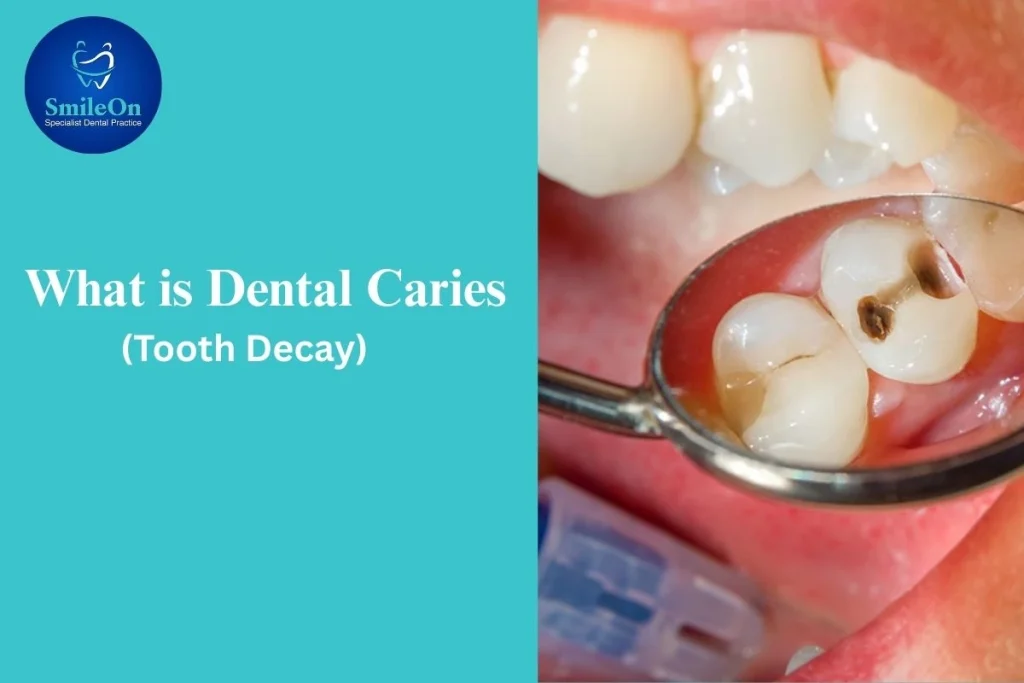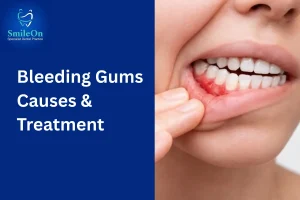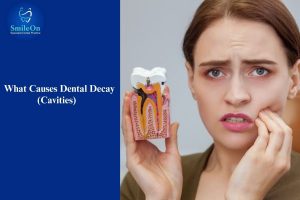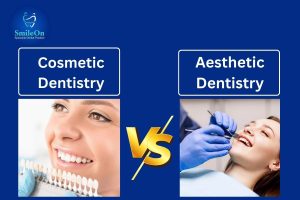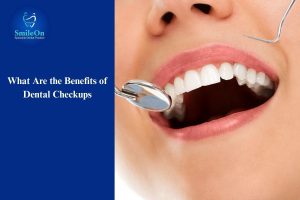Have you been in the middle of eating something delicious when an unexpected toothache strikes?
It is likely that you have tooth decay, also referred to as dental caries. This widespread dental issue can be seen in all age groups of patients. Cavities may begin as a small problem, but will not stay that way; they develop into painful cavities and can ultimately contribute to tooth loss.
The best news is that dental decay is preventable and can be treated by practicing good oral hygiene and visiting your dentist regularly. We are going to look at what dental caries are, types of dental caries, causes, and dental caries treatment options available using simple everyday words to provide you with the best care for your teeth.
Table of Contents
ToggleWhat Are Dental Caries?
Tooth decay, also known as cavities or dental caries, occurs when damage is done to the surface of a tooth (enamel). That damage occurs because of a sticky film of bacteria that grows on our teeth, known as plaque, which feeds off the sugars and starches in food. As plaque acid is continued to be created by these bacteria, it begins eroding the enamel and penetrates further into dentin and also the pulp of the tooth.
In other words, these are nothing but small holes or tooth-damaged areas created by the bacteria. Not only do they impact the appearance of your smile, but they can also become painful, sensitive and infected if ignored.
One of the most asked questions is, is there any difference between tooth decay vs caries?
It might confuse you to learn that you will often hear both of these used for tooth decay and dental caries. In simple terms:
- This disease is named tooth decay, which describes the process when bacteria destroy the tooth surface. It can cause cavities along with weakened tooth structure.
- Dental caries, on the other hand, is a medical term for this process or disease.
Types of Dental Caries
Cavities can appear in various areas of the tooth, and as a result, dentists may refer to them according to their location or how they have spread. The main types include:
Pit and Fissure Caries:
These appear on the chewing surface of back teeth (molars and premolars) in grooves. These grooves are deep and narrow, so that food particles or plaque can easily get caught, which is why they are one of the most frequent places where cavities happen.
Smooth Surface Caries:
Located on the flat areas of your teeth, while these sites are frequent on edges and in between them. These caries advance with less rapidity since the plaque will not adhere as readily to smooth enamel. But they remain more common in people who do not floss regularly.
Root Caries:
As youthful as teeth are, when we age, undergo gum disease or use the force too enthusiastically when brushing, our gums will pull back and the root of our teeth is revealed. Roots are coated with cementum, a softer material compared to enamel and more susceptible to decay.
Recurrent (Secondary) Caries:
These form at the margins of an old dental work or restoration (e.g. fillings, crowns and bridges). If plaque accumulates in these spots or the restoration doesn’t have a good fit, decay can restart at the margins.
Causes of Dental Caries
Tooth decay doesn’t happen overnight. It is a product of factors combining and acting over time:
Poor Oral Hygiene:
Not maintaining and following good dental hygiene. And this can lead to a buildup of plaque and bacteria.
Sugary and Starchy Foods:
Candy, soda, bread and even fruit juices give bacteria sugars to make acids that erode enamel.
Frequent Snacking:
Eating lends bacteria plenty of opportunities to attack your teeth.
Dry Mouth (Xerostomia):
Saliva rinses away food and helps neutralize acids. A dry mouth exposes the teeth to decay.
Weak Enamel:
For some, enamel is naturally thinner and the risk of getting cavities may be increased.
Not Visiting Dentist:
Skipping dental appointments for routine cleanings and check-ups can provide an opportunity for small caries to develop undetected.
Dental Caries Treatment Options
You can treat dental caries! However, the treatment varies according to the extent of destruction:
Fluoride Treatments:
Professional fluoride application in the early years can remineralize enamel and stop cavities in their tracks.
Dental Fillings:
If less damage has occurred, then you will need to have the decayed portion removed to apply a composite resin, silver amalgam filling or a ceramic one.
Crowns:
If the tooth is badly decayed, the affected tooth may need to have teeth crowns placed over it for added strength and aesthetics.
Root Canal Therapy:
Once decay gets to the center of the tooth, root canal treatment will be required to remove infection and save the tooth.
Tooth Extraction:
If the damage is extensive and the tooth cannot be saved, it needs to be extracted so that it can be replaced with a dental implant, bridge or denture.
In addition to treatments, dentists will suggest ways to prevent cavities from developing in the first place, such as daily brushing and flossing and routine dental checkups.
FAQs
Can dental caries be transmitted?
Yes. But, although you can’t “catch” cavities like a cold, the bacteria that cause dental caries can be transmitted through saliva. For instance, by means of sharing utensils.
How dental caries occur?
Dental caries happen when bacteria in the mouth feed on sugars and starches in food, creating acid. This acid eats away at the enamel and eventually forms holes (cavities) in the teeth.
How common is dental caries?
Very common. The World Health Organization reports dental caries remain one of the most prevalent health conditions in the world. Most people get tooth decay at some point in their lives.
Conclusion
While dental caries are one of the most commonly occurring diseases, when it comes to treating and preventing them, treatment may be easier than you think! You can safeguard your teeth and preserve your smile by following the tips for how to prevent cavities. Have good oral hygiene, eat less sugary snacks, and see the dentist regularly.
If you are feeling any tooth pain or have had cavities before, there’s no need to wait until things get worse. Come to SmileOn Dental Clinic for your premium, customized care and the latest in procedures to make you smile with confidence.


